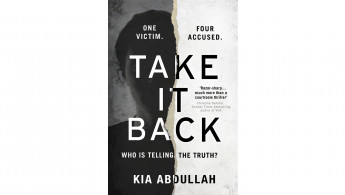Kia Abdullah: Breaking boundaries in publishing
A young white girl with facial deformities accuses four Muslim boys of rape – who's telling the truth?
Take it Back, Kia Abdullah's third novel, deals with a range of complex and controversial issues like Islamophobia and the #MeToo movement.
Released in August the crime novel has already attracted praise and rave reviews, catapulting Kia into the spotlight and giving other BAME (Black, Asian & Minority Ethnicities) authors a much needed platform to showcase their work.
We caught up with Kia to talk about her latest book and how she broke through the seemingly impenetrable publishing barrier.
Take it Back is set in London and centres around Zara Kaleel, a young Muslim lawyer who works with victims of sexual assault. One day, Jodie, a 16-year-old girl with a facial deformity walks into Zara's office and accuses four of her Muslim classmates of raping her. Zara's life begins to unravel as she fights for justice while facing accusations of betrayal from the Muslim community.
Discussing the inspiration behind Take it Back, Kia explains how it came from a place of anger.
"I was angry for nearly my whole twenties" she says. "I was raised in a conservative Muslim family and struggled with the pressures it placed on me: to marry early, to be quiet, to be docile, to be good. I struggled with the faith-based tribalism that said 'if you act this way, you can't be one of us'.
 |
|
| Kia Abdullah has been writing for well over a decade |
"At the same time, I could see how the mood in the media was turning against the Muslim community and that made me feel really uncomfortable. Take It Back allowed me to examine this conflict. It's a courtroom thriller at heart, but it also asks: how do we judge people based on what they look like or what they believe in? That is really the root of the novel."
Although a relatively new name in the publishing industry, Kia has been writing for well over a decade. As well as running a popular travel blog (Atlas & Boots), she's written for The Telegraph, NY Times and Guardian, and had two novels previously published by smaller publishing houses.
However, growing up in Tower Hamlets, in a family of eight with Bangladeshi immigrant parents, Kia's dreams of being a writer wasn't met with enthusiasm.
"My parents thought I would grow out of it and they were almost right," Kia reflects."I wanted to be a writer, but chose to study Computer Science as it offered better job prospects and more stability."
However, after three years working her way up the corporate ladder Kia published a guest column in Asian Woman magazine, which reignited her ambitions as a writer.
"I quit my job in IT and took a 50 percent pay cut to write," she recalls. "I'm not sure my mother has ever recovered! She still tells people that I 'work with computers.'"
Statistically, Kia's chance of getting published with a mainstream publishing house was low. In 2016, of the 165,000 new titles published in the UK, fewer than 100 were by BAME authors.
 |
In 2016, of the 165,000 new titles published in the UK, fewer than 100 were by BAME authors |  |
Although Kia believes that things have improved marginally, she still agrees that there's still much more to be done: "I think the problem is two-fold. First, there's the gatekeeping. When editors say they didn't 'connect' with a BAME character, is that because they are looking at them through the lens of a white middle-class publishing professional?
"I believe that improving diversity in-house (i.e. among agents, commissioning editors, heads of imprints) will ultimately improve diversity out of house."
Kia also believes that the lack of diversity lies in the lack of BAME writers. "I don't think it's too much of a generalisation to say that second-gen immigrant kids like me are encouraged by their families to pursue academic careers.
"This creates a vicious cycle: we're told to be academic because we don't see people like us in the arts and we don't see people like us in the arts because we're told to be academic."
Proving that it 'can be done' Kia also reveals that readers can expect a second instalment of her novel soon.
"There will be another novel with Zara, the main protagonist. It will focus on an entirely new case, but readers will get an idea of what happened following the ending of Take It Back."
And finally, when asked what advice she would give to an ethnic minority author Kia replies: "Don't wait for permission. Start a blog or newsletter or podcast, or something through which you can showcase your skill.
"A blog might sound passé, but it serves two purposes. First, it enables you to prove to editors that you can write consistently well. Second, it helps you build an audience (or 'tribe') which you can harness later.
"Author and blogger Seth Godin says the best time to start marketing your book is three years before you've written it. The point is: it's never too early to start building your audience."
Sami Rahman is a freelance writer based in London.
Follow her on Twitter: @bysamirahman
The New Arab Book Club: Click on our Special Contents tab to read more book reviews and interviews with authors:



